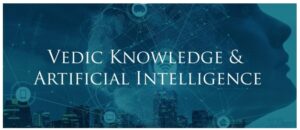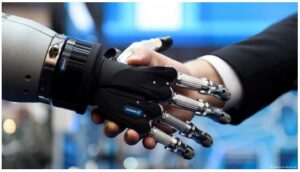HOW THE BHAGAVADGITA CAN FOSTER ETHICAL AI DEVELOPMENT?

The Bhagavad Gita is a Hindu scripture that contains teachings on spirituality, morality, and ethics. Although it was written thousands of years ago, its lessons continue to be relevant today, including in the field of artificial intelligence. One of the central themes of the Bhagavad Gita is the importance of detachment from outcomes. In the context of AI, this means that we should not become too attached to specific outcomes or results. Instead, we should focus on the process of developing AI systems and ensure that we are following ethical and moral principles.

DETACHMENT
The concept of detachment from outcomes is an important principle in the Bhagavad Gita that emphasizes the importance of focusing on the process rather than the results. This means that we should focus on the journey of developing AI systems rather than getting too attached to a specific outcome or result. In the context of AI, this means that we should not be solely focused on achieving specific goals, such as achieving high accuracy or maximizing profit, at the expense of ethical and moral principles. Instead, we should prioritize the development of AI systems that are ethical, responsible, and
beneficial for society and the planet. For instance, in the pursuit of achieving high accuracy or performance of an AI system, developers may overlook or ignore the potential biases or harms that the system may cause in practice. Detachment from outcomes can help AI developers and researchers to focus on the ethical and moral implications of the development process and ensure that the end product is aligned with ethical principles.

Another application of detachment from outcomes in AI is to embrace a process-oriented approach to AI development. Instead of solely focusing on achieving specific goals, such as increasing revenue or achieving higher accuracy rates, AI developers and researchers can focus on following ethical and moral principles throughout the development process. For example, in developing an AI system for recruitment, instead of solely aiming to hire the most qualified candidates, developers can focus on building a system that promotes fairness and equity by avoiding biases related to race, gender, or other
factors.

Furthermore, detachment from outcomes can encourage researchers and developers to explore alternative paths that may lead to better ethical outcomes. For example, if an AI system is designed to optimize profits, developers may prioritize cost-cutting measures, such as automating jobs or outsourcing, which may lead to social and economic inequality. Detachment from outcomes can encourage developers to consider other paths that prioritize the ethical implications of the system and the welfare of the affected stakeholders.

Further, in the development of autonomous vehicles, the focus should not only be on achieving the goal of creating cars that can drive themselves, but also on ensuring that they are developed in a way that prioritizes the safety of pedestrians, passengers, and other drivers. This means that ethical considerations, such as avoiding bias and ensuring transparency in decision-making, should be integrated into the development process.

Another example is in the field of healthcare. AI is being used to develop new medical treatments and diagnostic tools. However, in order to ensure that these AI systems are developed in a responsible and ethical manner, it is important to focus on the process of developing these tools, ensuring that they are grounded in sound scientific principles and that they adhere to ethical and moral principles, such as ensuring privacy and avoiding discrimination. One important application of detachment from outcomes in AI is to avoid the overreliance on specific outcomes or results that may lead to ethical issues or harms. By focusing on the journey rather than the destination, we can develop AI systems that are responsible, ethical, and beneficial for society and the planet.
In summary, detachment from outcomes is an essential principle that can help promote ethical and responsible development of AI systems. By focusing on the process of development rather than the end result, AI developers and researchers can ensure that the systems they create are aligned with ethical principles and promote the welfare of all stakeholders involved.
DHARMA

Another important lesson from the Bhagavad Gita is the idea of dharma or duty. In the context of AI, this means that we should be responsible for ensuring that AI is used for the benefit of humanity and the planet, and that it does not cause harm. The concept of dharma, or duty, is an important principle in the Bhagavad Gita that emphasizes the responsibility of individuals to act in a way that benefits humanity and the planet. In the context of AI, this means that developers and users of AI have a duty to ensure that AI is used for the greater good and does not cause harm.

One important application of this principle is in the development of AI systems for decision-making in fields such as finance, healthcare, and criminal justice. These AI systems can have a significant impact on people’s lives, so it is important to ensure that they are developed in a way that is fair and just, and that they do not perpetuate or exacerbate existing biases and inequalities.
For example, AI systems are being developed to assist judges and lawyers in making decisions about bail and sentencing in the criminal justice system. However, these AI systems can be biased if they are trained on historical data that reflects systemic inequalities in the criminal justice system. To ensure that these systems are developed in a way that is fair and just, it is important to consider the principles of dharma and duty by ensuring that the AI system is designed to reduce, rather than amplify, existing biases and inequalities.

Another application of the principle of dharma in AI is in the development of autonomous weapons. As AI technology advances, there is a risk that it could be used to develop weapons that can operate without human intervention. However, the use of such weapons raises ethical and moral concerns, and it is important to consider the principles of dharma and duty in deciding whether such weapons should be developed and deployed.
Furthermore, AI can be used in the development of technologies that address global challenges such as climate change and environmental degradation. For example, AI can be used to develop more efficient energy systems, to monitor and protect wildlife, and to predict natural disasters. In developing these technologies, it is important to consider the principles of dharma and duty by ensuring that they are developed in a way that benefits humanity and the planet, rather than perpetuating or exacerbating environmental problems.

In conclusion, the principle of dharma in the Bhagavad Gita emphasizes the importance of using AI for the greater good and ensuring that it does not cause harm. By considering the principles of dharma and duty, developers and users of AI can ensure that AI is developed and used in a way that is ethical, responsible, and beneficial for humanity and the planet.
SELF-INTROSPECTION AND REFLECTION

The Bhagavad Gita also teaches the importance of self-reflection and introspection. In the context of AI, this means that we should constantly evaluate and reflect on the ethical implications of our work and the impact it has on society. The Bhagavad Gita teaches the importance of self-reflection and introspection as a means of achieving self-awareness and personal growth. In the context of AI, this means that we should constantly evaluate and reflect on the ethical implications of our work and the impact it has on society. This is particularly important given the potential for AI to have far-reaching and unintended consequences.

One example of how self-reflection and introspection can be applied in the development of AI is through the use of ethical frameworks and guidelines. These frameworks and guidelines can provide a set of principles and values that can be used to evaluate the ethical implications of AI systems. By reflecting on the ethical implications of our work, we can ensure that we are developing AI systems in a way that is aligned with ethical principles and values.
Another example is through the use of participatory design methods, which involve engaging with stakeholders and users throughout the development process. This can include soliciting feedback on the ethical implications of AI systems and involving stakeholders in decision-making processes. By engaging in a process of self-reflection and introspection, we can ensure that AI systems are developed in a way that is responsive to the needs and concerns of stakeholders, and that they are aligned with ethical principles and values.

Self-reflection and introspection can also be applied in the deployment of AI systems. This involves evaluating the impact that AI systems have on society and the environment, and reflecting on whether they are aligned with ethical principles and values. For example, if an AI system is found to be causing harm or perpetuating bias, it may be necessary to engage in a process of self-reflection and introspection to identify and address the root causes of these issues.
In conclusion, the principle of self-reflection and introspection in the Bhagavad Gita emphasizes the importance of continuously evaluating and reflecting on the ethical implications of our work in AI. By engaging in a process of self-reflection and introspection, we can ensure that AI systems are developed and deployed in a way that is ethical, responsible, and beneficial for society and the planet.
LIVING NOW AND MINDFULNESS
Finally, the Bhagavad Gita emphasizes the importance of mindfulness and living in the present moment. In the context of AI, this means that we should be aware of the potential consequences of our actions and decisions, and take a long-term perspective when developing AI systems. Overall, the teachings of the Bhagavad Gita can help us develop AI systems that are ethical, responsible, and beneficial for humanity and the planet.

The Bhagavad Gita emphasizes the importance of mindfulness and living in the present moment as a means of achieving inner peace and clarity of thought. In the context of AI, this means that we should be aware of the potential consequences of our actions and decisions, and take a long-term perspective when developing AI systems. This is particularly important given the potential for AI to have far- reaching and long-term impacts on society and the planet.

One example of how mindfulness and a long-term perspective can be applied in the development of AI is through the use of scenario planning and foresight techniques. These techniques involve imagining and exploring different possible futures, and considering the potential consequences of different decisions and actions. By taking a long-term perspective, we can anticipate and prepare for potential future scenarios, and ensure that AI systems are developed in a way that is robust and resilient in the face of uncertainty and change.
Another example is through the use of sustainable and ethical design principles. This involves designing AI systems that are optimized for long-term sustainability and ethical impact, rather than short-term gains. By adopting a mindfulness-based approach to design, we can ensure that AI systems are developed in a way that is aligned with our values and priorities, and that they contribute to a more sustainable and equitable future.

Mindfulness can also be applied in the deployment of AI systems. This involves being aware of the potential unintended consequences of AI systems, and taking steps to mitigate these risks. For example, if an AI system is found to be causing harm or perpetuating bias, it may be necessary to pause and reflect on the root causes of these issues, and take steps to address them before deploying the system further. In conclusion, the principle of mindfulness and living in the present moment in the Bhagavad Gita emphasizes the importance of taking a long-term perspective when developing and deploying AI systems. By adopting a mindfulness-based approach to AI, we can ensure that AI systems are developed and deployed in a way that is sustainable, ethical, and aligned with our values and priorities.
CONCLUSION

In summary, the Bhagavad Gita provides valuable lessons for developing ethical AI systems. By prioritizing detachment from outcomes, dharma or duty, self-reflection and introspection, and mindfulness, AI developers and researchers can ensure that AI systems are developed in an ethical and responsible manner, and that they promote the welfare of all stakeholders involved. These lessons can help guide us in developing AI systems that are aligned with moral principles and promote the long-term welfare of humanity and the planet.
 Dr K. Jayanth Murali is a retired IPS officer and a Life Coach. He is the author of four books, including the best-selling 42 Mondays. He is passionate about painting, farming, and long-distance running. He has run several marathons and has two entries in the Asian book of Records in full and half marathon categories. He lives with his family in Chennai, India. When he is not running, he is either writing or chilling with a book.
Dr K. Jayanth Murali is a retired IPS officer and a Life Coach. He is the author of four books, including the best-selling 42 Mondays. He is passionate about painting, farming, and long-distance running. He has run several marathons and has two entries in the Asian book of Records in full and half marathon categories. He lives with his family in Chennai, India. When he is not running, he is either writing or chilling with a book.

Mar 9, 2023 at 10:22 AM /
Thank you for sharing with us, I think this website truly stands out : D.